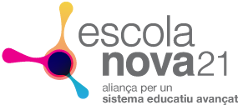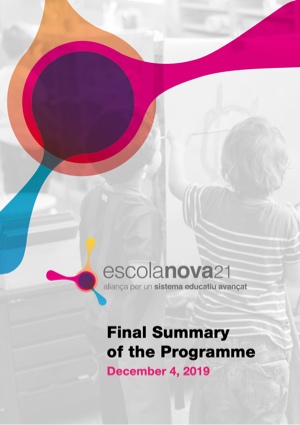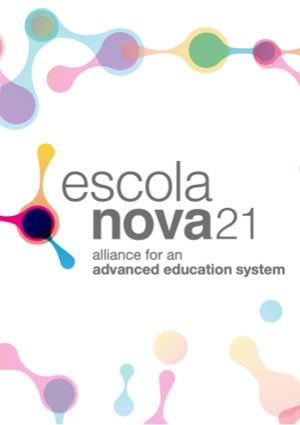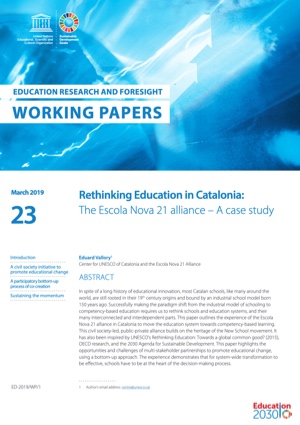Escola Nova 21
Escola Nova 21 (“New School 21”) has been an alliance of schools and civil society institutions for an advanced education system that has been carried out between 2016 and 2019, responding to the 2030 Agenda of the United Nations and to UNESCO’s call for the participation of all sectors in an inclusive process to make possible the education paradigm shift. Escola Nova 21 was created in January 2016 through an agreement between UNESCOCAT-Center for the UNESCO of Catalonia, the Jaume Bofill Foundation and the Open University of Catalonia (UOC), which were then joined by the “la Caixa” Foundation and, later on, by the Provincial Government of Barcelona (“Diputació de Barcelona”). It finished in December 2019.
At its inception in 2016, the Alliance signed an agreement of collaboration with the Government of Catalonia’s Department of Education, with which it worked to jointly plan its actions in order to ensure that they bolster the efforts of public education administrations. In the city of Barcelona, Escola Nova 21’s approach was articulated through Networks for Change (“Xarxes per al Canvi”), an initiative led by the Barcelona Education Consortium (a public entity that combines the efforts of the Barcelona City Council and the Government of Catalonia).
Escola Nova 21 has proposed a transformation of the Catalan educational system to bring it fully up-to-date, embracing a purpose aimed at developing competencies for life, in our historical context, and adopting learning practices based on existing knowledge of how people learn.
The ultimate goal has been that all children, regardless of their context or conditions, in all schools, be able to enjoy empowering and relevant learning experiences that allow them to develop their life projects with dignity, meaning, and well-being.
The common horizon of change for all schools was grounded in a framework that supports many possible educational models and projects that have in common these four interconnected and interdependent axes:
- Educational purpose for the whole development of the child, aimed at developing competencies for life;
- Learning practices based on the existing knowledge of how people learn;
- Competency-based and holistic evaluation, designed to support learning; and
- Autonomous and open organization, capable of self-reflection, innovation, and change.
Escola Nova 21 has intended to catalyze support for educational change through a three-year program designed to generate no-return momentum for the transformation of the entire Catalan education system. It has done so through four principal actions: Supporting and consolidating already existing projects for transformation in schools and in the system; Engaging in collaborative work for educational change; Building alliances with education administrations and local governments in order to develop co-responsibility for change; And generating and experimenting with protocols for system-wide change.
First, Escola Nova 21 has highlighted and celebrated a diverse group of Catalan schools that are already focused on developing competencies for life, and that have adopted practices grounded in how people learn. The program’s 25 founding schools have been a wonderful example of these efforts, and the program has worked to ensure that their efforts were consolidated, that they become used as points of reference, and that the educational system as a whole moved in a similar direction. This requires that regulation, and decisions made by the relevant public administrations, support a shared vision of that school as autonomous, inclusive, and competency-based and holistic in its approach to learning.
Second, Escola Nova 21 has supported broad collaborative action to update the educational system through the work of hundreds of volunteer schools, in conjunction with the partnership of local governments. In 2016, an open call identified 481 centers willing to join this program and, thanks to an agreement with several local and educational administrations, more than sixty territorial networks of between 6-10 schools each were established. These networks used collaborative learning practices and the “Spiral of Inquiry” methodology to advance their processes of change. The interaction of thousands of teachers involved in these schools is the most horizontal and sustainable way of supporting educational transformation.
Third, Escola Nova 21 has collaborated extensively with educational administrations, which is of fundamental importance if change to be generalized in the education system. In this regard, Escola Nova 21 established an agreement with the Barcelona Education Consortium (“Consorci d’Educació de Barcelona”, composed by the City of Barcelona and the Catalan Government) to articulate the Escola Nova 21 networks in the Networks for Change (“Xarxes per al Canvi”) program, led by the Consortium itself, which moves forward the commitment to progressively generalize the process of change within all schools in the city of Barcelona. The Alliance also worked with the educational administration and local administrations to extend the model of this agreement to the whole of the Catalan educational system.
Finally, Escola Nova 21 has gathered efforts and knowledge in order to generate procedures that allow a systematic update of all schools. It has done so thanks to the commitment and generosity of 30 schools that had voluntarily agreed to form part of a representative sample constructed on the basis of percentage of geographic distribution, socioeconomic profile, degree of complexity, school level (primary / secondary), and other characteristics (rural schools, large schools, public and charter schools) of the current system. The purpose of this sample has been that the procedures and training actions that have been generated through this three-year interaction can be used to generalize actions for the transformation of schools by the corresponding institutions.
The Escola Nova 21 programme has lasted 3 years (2016-2019), to catalyse the desire for change, to generate strong citizen and social involvement in the challenge of updating the educational system, and to facilitate the various agents in the educational system, including the educational administration, to become progressively coordinated agents of systematic work for its updating. Therefore, the impact of the Alliance has not been limited to the three courses, but rather it has wanted to establish in these three years the basis for a lasting and integral transformation.





